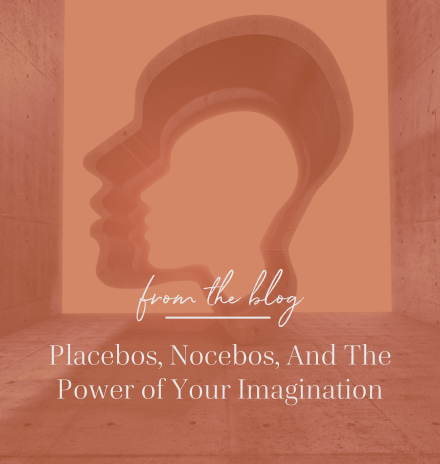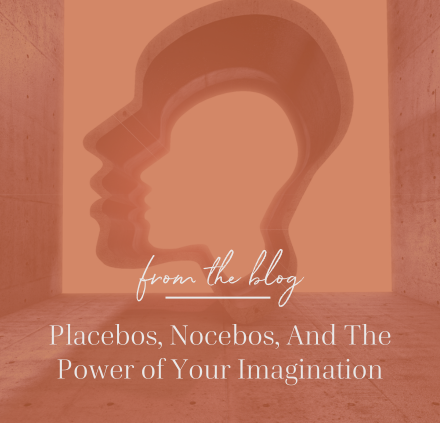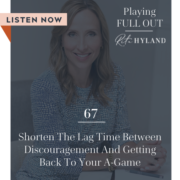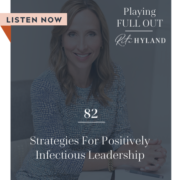Placebos, Nocebos, and The Power of Your Imagination

Recently, I’ve been challenged by rotator cuff pain. Truth be told, it’s not recent. It’s been painful for over nine months. I’ve been waiting for it to ‘self-correct.’ Something my body always did when I was young.
If you listened to me talk about it, you’d hear me saying things like, “I’m getting old.” “I don’t think it’s going to heal without surgery.” “This is what happens when you age.”
As I succumbed to the realization that my shoulder was not going to self-correct, I went this week to my first physical therapy session. I was tearfully repeating these very things to my new physical therapist when it occurred to me: I know better.
The mind can create real, measurable changes in the body — and I was overdosing on negative thoughts and wishes.
Stop for a moment. Close your eyes. See a fresh plump lemon. Glossy with bright yellow skin. You pick it up and slice it into the lemon. As you cut into it, you see the juice spray out and drip down your fingers. Now you place a lemon wedge into your mouth and suck all the juice right out of it. Does your mouth pucker or fill with saliva?
You just experienced the mind-body connection. This visualization is a simple but powerful way to show you how the mind and body unite.
Years ago I got really taken with the power of the mind-body connection. When I was just beginning to learn the power of our mind’s ability to impact our body, I became fascinated with stories of spontaneous remission and people overcoming the most debilitating illnesses that seemed impossible without medical intervention.
At the time I soaked it all in, but the healings seemed more like miracles than anything scientifically valid.
Then I learned about the placebo effect which is mainstream science’s recognition of the fact that the mind can create real, measurable changes in the body.
The placebo effect is when patients think they’re getting a new drug, but what they’re really getting is a sugar pill. Then they start to recover from their ailment as though they’d been taking the real deal.
It turns out you don’t even have to be sick for it to have an effect. In a study at the University of Glasgow, researchers told fifteen runners that they were being administered drugs and then asked them to run a race. The runners’ race times increased significantly even though they were getting only saline injections.
The placebo effect provides proof that when we believe we are going to get better or feel better, we often do. It’s a testament to the power of the mind to affect the body with mere suggestion.
But did you know that there is a flip side to this? It’s called the nocebo effect. It’s what happens when you’re given a sugar pill and are told it’s a drug that has terrible side effects. Believing you’re taking a real medication, many people actually begin to experience the warned-about side effects.
A documented case of the nocebo effect occurred when a twenty-six-year-old man who was participating in a clinical trial on antidepressants was rushed to the hospital after an attempted overdose. He took 29 of the pills. When he arrived at the hospital, his blood pressure dropped to dangerously low, near-death levels and he was sweating, shaking, and breathing. When the doctor from the clinical trial arrived at the hospital, he realized that the young man had been in the placebo group. The young man hadn’t overdosed on medication. He had overdosed on his negative thoughts.
Dr. John Kelley, Ph.D., deputy director of Harvard Medical School’s Program in Placebo Studies and Therapeutic Encounter says, “It’s the power of imagination…Just imagining something is happening is enough to activate those portions of the brain associated with that thought, or worry, or pain.”
I bring this topic up not to whine about my rotator cuff, but because I know right now you or someone you love may be worried about something. Maybe it’s health scares or treatments or even an impending surgery.
Any of these can be challenging by themselves. Even to the most resilient, any one of these can feel downright debilitating.
But it’s important to remember —as someone who forgot — that we are actively participating in our mental and physical wellness with every thought.
As for my rotator cuff, after one physical therapy session along with my decision to stop judging, insulting, and expecting the worst from my body, I woke the next day pain-free. I’d slept through the night without waking from pain for the first time in months.
I called it a “miracle” when I saw the therapist two days later.
Whether it was or it was a result of moving my thoughts, imagining something better, or the treatment I’d received, I didn’t care.
My mind and body were connecting, proving my new thought —“Every day I’m getting and feeling better.”








Leave a Reply
Want to join the discussion?Feel free to contribute!